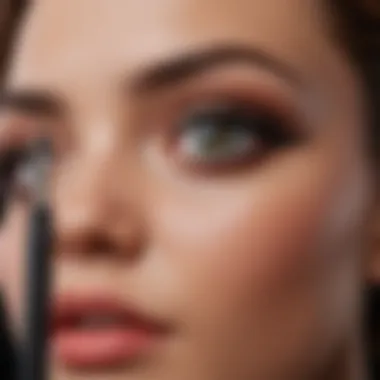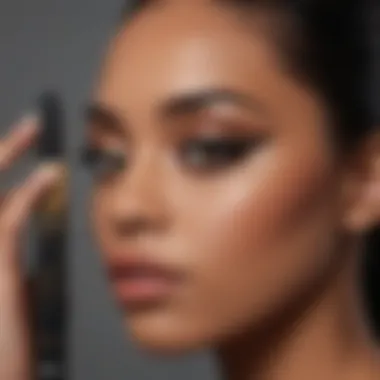Exploring Black-Owned Eyeliner Brands: Quality and Diversity


Intro
In recent years, black-owned eyeliner brands have made significant inroads within the cosmetics industry. This emergence is not merely a market opportunity but reflects a deeper need for representation and quality that reflects diverse beauty standards. As consumers become more aware of the brands they support, the importance of these businesses is increasingly evident. The quality of their products often equals, if not surpasses, that of more mainstream options.
With their unique formulations and innovative designs, black-owned eyeliner brands contribute richly to beauty culture. This exploration sheds light on how these brands offer fresh perspectives and embrace diversity, paving the way for an inclusive beauty narrative.
Fashion Trends
Seasonal Styles
Black-owned eyeliner brands are not just creating products; they are shaping trends. Seasonal styles have evolved as brands introduce colors and formulations that resonate with cultural narratives. For instance, during the summer months, vibrant shades and liquid eyeliners have become prevalent, often inspired by the boldness of African art and heritage. Meanwhile, fall and winter products may feature darker, more muted tones, aligning with classic beauty aesthetics, yet offered through a culturally rich lens.
Influencer Inspirations
Social media has played a crucial role in advancing black-owned eyeliner brands. Influencers on platforms like Instagram and TikTok showcase these products in their routines, influencing audience perceptions. Through tutorials and reviews, they highlight unique features such as smudge-proof formulas or creamy finishes. Their authentic representations help normalizing diversity in beauty standards and influence purchasing behaviors among their followers.
Beauty Tips
Skincare Routines
Before applying eyeliner, a good skincare routine is essential. Many black-owned brands emphasize skin health by creating makeup that complements various skin types and tones. Products are often designed to hydrate and prepare the skin, addressing specific concerns like acne or hyperpigmentation. This focus on skincare ensures that makeup application enhances rather than detracts from natural beauty.
Makeup Techniques
Applying eyeliner can vary widely based on desired looks. One effective technique is the winged eyeliner, which has become a staple across many beauty cultures. Black-owned brands offer eyeliners that are easy to use for this style. Additionally, combining various eyeliner types—such as pencil and gel—can create depth and dimension in eye looks. Tutorials that incorporate these techniques can often be found on YouTube, amplifying the visibility of these brands.
Product Reviews
Trending Products
Some black-owned eyeliner brands have gained attention for their popular products. For example, brands like Fenty Beauty and Juvia's Place offer eyeliners that receive high praise for their pigmentation and long-lasting formulas. Customers often share their experiences on social media, creating buzz that translates into sales.
Comparison Guides
When choosing an eyeliner, consideration of different formulations and features is essential. A comparison guide can help consumers make informed decisions. Factors such as waterproof capabilities, ease of application, and color range should be evaluated. Such guides can often be found on beauty blogs or forums, offering detailed insights into how these products stack up against competitors in the market.
The rise of black-owned eyeliner brands is not simply a trend but a vital part of a larger conversation about representation in beauty.
Intro to Black-Owned Eyeliner Brands
The significance of black-owned eyeliner brands holds a central place in the broader context of the beauty industry. These brands are not just about beauty; they represent empowerment, culture, and representation in a landscape that has often sidelined minority voices. As the industry has grown, so too has the recognition of the unique contributions that black-owned businesses bring. This article aims to highlight these essential aspects.
Defining Black-Owned Businesses in Beauty
Black-owned businesses in the beauty sector encompass a wide range of brands that are managed or owned by individuals of African descent. This classification can be simple yet impacts profoundly how these brands are perceived and the kind of public support they receive. According to research from the Small Business Administration, black entrepreneurs run over two million businesses in the United States, contributing significantly to economic development and cultural innovation.
These brands are vital not only for their products but also for fostering a culture of inclusivity. They often prioritize ingredient transparency, ethical sourcing, and community engagement, setting a standard that more established brands are starting to follow. Ultimately, defining and supporting black-owned businesses in beauty is crucial to promoting diversity and representation within the market.


The Evolution of Eyeliner Products
The evolution of eyeliner products reflects broader trends in cosmetics and consumer preferences. Historically, eyeliner has been a staple in many beauty routines, but its formulations and styles have transformed significantly over the years. Initially, eyeliners were simple kohl sticks and liquid formulas. Now, the market includes an array of options such as gel, pencil, and even retractable pens, catering to various techniques and preferences.
Brand innovation has led to products that offer unique features, such as waterproof formulas or smudge-proof finishes. Additionally, there has been a pronounced shift toward more inclusive shade ranges. Black-owned eyeliner brands frequently emphasize shades that complement darker skin tones, which has often been neglected by larger brands. This evolution not only showcases the development of products but also highlights the growing demand for diversity within the beauty industry.
"Supporting black-owned beauty brands ensures that voices from all backgrounds are heard in the industry, enriching the beauty landscape."
Through this deep dive, we seek to explore the quality and diversity that black-owned eyeliner brands offer, giving due recognition to their role in shaping beauty culture.
The Importance of Representation
Representation in the cosmetics industry plays a crucial role in shaping the narratives surrounding beauty and self-identity. Black-owned eyeliner brands not only offer products that cater to the diverse needs of their consumers but also promote a sense of belonging and understanding within the beauty community. These brands challenge the prevailing standards that have often excluded or marginalized voices from underrepresented backgrounds. By doing so, they empower individuals to embrace their unique identities and express themselves authentically through makeup.
When consumers see brands that reflect their culture and experiences, it fosters trust and loyalty. It creates a bond that transcends mere transactions, allowing for deeper connections. Representation goes beyond just having products available; it involves actively engaging with the community, understanding their needs, and honoring their heritage. This generates a cycle of support and appreciation, which ultimately benefits both the brands and their consumers.
Cultural Significance of Black-Owned Brands
Black-owned beauty brands are significant for several reasons. Culturally, they serve as vessels for storytelling and self-expression. Many of these brands incorporate their heritage into their product lines, whether through the names of products, packaging designs, or marketing strategies. This cultural grounding is essential for celebrating diversity and contributing to a more inclusive beauty industry. For example, brands like Fenty Beauty have changed the conversation around shade ranges and inclusivity, demonstrating that beauty comes in many forms.
Moreover, Black-owned brands tend to honor traditional practices while innovating to meet modern needs. These brands often blend ancestral knowledge with contemporary techniques to create products that resonate on both personal and cultural levels. Consumers who support these brands are not just purchasing makeup but are also endorsing a narrative that respects history and forward-thinking innovation.
Consumer Trends and Preferences
In recent years, trends indicate a growing consumer shift towards supporting Black-owned businesses. This movement aligns with a broader societal push for equity and justice, motivating consumers to seek out brands that align with their values. Women of all ages are increasingly conscious of where they spend their money, showing preference for products that reflect their identity and beliefs.
Factors such as ingredient transparency, sustainability, and ethical production practices have influenced shopping behavior. Black-owned eyeliner brands often emphasize these elements, appealing to a socially aware consumer base. As awareness grows, more shoppers are prioritizing brands that promote diversity, equity, and inclusivity in both their product offerings and corporate practices.
"Investing in Black-owned brands is not just about purchasing products; it's about supporting a movement towards equality and representation in the beauty industry."
Consumers also appreciate the personal stories behind Black-owned brands. Many these businesses started as outlets for creative expression and community betterment. Knowing a brand’s journey often resonates with shoppers, turning a simple product purchase into an act of solidarity.
The intersection of cultural significance and evolving consumer preferences highlights the necessity for representation in beauty. Black-owned eyeliner brands are essential players in this transformation, ensuring that the voices of diverse communities are seen and heard in the marketplace.
Top Black-Owned Eyeliner Brands
Black-owned eyeliner brands represent a critical segment within the beauty industry. They are not only redefining product quality but also emphasizing diversity in beauty. The importance of focusing on these brands lies in their commitment to innovation and the unique perspectives they bring to cosmetics. Additionally, they can often cater to a more diverse customer base, addressing specific needs like skin tones and textures.
Brand A: Vision and Innovation
Product Lines Overview
Brand A is notable for its extensive range of eyeliners designed to cater to various styles and preferences. This brand has effectively established a reputation for combining vibrant colors with long-lasting formulas. Their eyeliner products often include liquid, pencil, and gel options, each tailored for different techniques and looks. One key characteristic of Brand A’s product line is its commitment to inclusivity; they strive to craft products that appeal to a wide audience. This makes their offerings beneficial for consumers looking for reliable and diverse choices in eyeliner. The unique feature that sets Brand A apart is its fusion of high-quality ingredients with creative packaging. This visually appealing design not only attracts customers but communicates the brand's ethos of artistry.
Unique Selling Proposition
The unique selling proposition of Brand A lies in its innovative approach to product development. While many brands focus solely on color, Brand A emphasizes formula longevity and skin compatibility. This focus means the products work well for all users, including those with sensitive skin. A key characteristic of this proposition is the integration of natural ingredients which enhances appeal for health-conscious consumers. This aspect has made Brand A a popular choice, as many customers are increasingly aware of product compositions. However, some users might find a higher price point as a disadvantage, though many believe the quality justifies the cost.
Brand B: Sustainability Focus


Ingredient Transparency
Brand B excels in ingredient transparency, reflecting a growing demand for honesty in product formulations. Their commitment to disclose every ingredient allows consumers to make informed choices, particularly important in today's climate of heightened health awareness. The clarity provided by Brand B builds trust with its audience and reinforces their commitment to quality, making it a beneficial option for consumers who prioritize health. A unique feature is their use of ethically sourced ingredients. This not only fortifies the brand's values but attracts environmentally conscious customers.
Eco-Friendly Packaging
Brand B also prioritizes eco-friendly packaging across its product lines. This commitment reduces waste and appeals to an audience increasingly concerned with environmental impact. The key characteristic of eco-friendly packaging is its ability to minimize the carbon footprint while maintaining product integrity. This initiative positions the brand as a leader in sustainability within the cosmetics space. While eco-friendly packaging can sometimes increase production costs leading to higher retail prices, many consumers are willing to invest a bit more for a product that aligns with their environmental beliefs.
Brand C: Community Engagement
Social Responsibility Initiatives
Brand C actively engages in social responsibility initiatives, making significant contributions to the communities they serve. This brand supports local programs focused on education and empowerment, aligning its business practice with socially positive outcomes. The key characteristic here is that Brand C's initiatives often resonate deeply with consumers who are not just purchasing a product but are also supporting a broader cause. This focus on community engagement makes Brand C a popular choice for buyers who value brands with a conscience. However, the challenge remains for the brand to maintain its profitability while being socially responsible, creating a balance between mission and margins.
Collaborative Efforts with Influencers
Collaborative efforts with influencers have become a hallmark of Brand C’s marketing strategy. By partnering with voices that resonate within their target demographics, Brand C amplifies its reach and connects authentically with consumers. This collaboration encourages a community feel around the brand, as influencers often share their personal experiences with the products. The crucial feature of this approach is the relatability it fosters, making potential customers feel connected to the brand on a personal level. However, reliance on influencers may pose some risks, such as brand image fluctuations depending on influencer popularity and public perception.
Analysis of Product Quality and Diversity
The assessment of product quality and diversity within black-owned eyeliner brands holds significant relevance in understanding their impact on the beauty industry. This thorough examination highlights how quality directly affects consumer satisfaction and brand loyalty. A well-formed product can enhance the reputation of a brand, encouraging repeat customers. Diversity in offerings allows brands to cater to a broader audience, addressing individual needs and preferences.
Quality can be measured in various aspects, including texture, longevity, and the overall application experience. A product that applies smoothly enhances user experience. Meanwhile, diversity, particularly in shades and formulations, is crucial for inclusivity. Capturing the unique needs of different skin tones ensures that all consumers can find suitable products. Black-owned eyeliner brands have been making strides in these areas, often bringing forward innovative formulas and shades that resonate with their target audience.
Texture and Application Experience
The texture of an eyeliner plays a vital role in its functionality and user experience. A smooth texture ensures that the eyeliner glides easily, reducing the chances of uneven application. Various formulations, such as gel, liquid, or pencil, offer different experiences. For instance, gel liners can provide a rich, pigmented line, while liquid liners often offer precision for more intricate designs.
What sets apart black-owned brands is their attention to how their products feel during application. Many have invested in research to create eyeliners that are not only long-lasting but also comfortable to wear throughout the day. This means that users do not experience irritation or cracking around the eyes, which can be common with lower-quality products.
It is also important to highlight the overall user experience post-application. Products that maintain their vibrancy and do not smudge easily can vastly improve consumer satisfaction. This commitment to quality ensures that users enjoy the product not just initially, but over the entire duration they wear it.
Shade Range and Inclusivity
In recent years, there has been a growing awareness regarding the necessity for inclusive products in the beauty sector. For black-owned eyeliner brands, offering a diverse range of shades is not just a business strategy but a commitment to representation. Traditional beauty brands often overlook the needs of women of color, resulting in a lack of suitable options. Black-owned brands directly address this gap by curating products that suit a variety of skin tones.
Inclusive shade ranges include not only different colors but varying undertones as well. It is essential for users to find eyeliner shades that complement their natural tones. Moreover, these brands sometimes offer formulations designed specifically for deeper skin tones, enhancing the vibrancy and visibility of the color.
"When consumers see themselves represented in a product line, it fosters trust and loyalty to the brand."
These strategies not only attract customers but also make them feel valued. In essence, the combination of quality and diverse product offerings positions black-owned eyeliner brands uniquely in the market, allowing them to create a lasting impact in the beauty industry.
Understanding Market Dynamics
The dynamics of the market play a crucial role in shaping the landscape for black-owned eyeliner brands. Understanding these dynamics is essential not only for industry stakeholders but also for consumers who seek to make informed choices. This section will explore the specific challenges black-owned brands face and the opportunities available to them. By examining these aspects, we can appreciate the nuances of their market positioning and the broader implications for the beauty industry.
Challenges Faced by Black-Owned Brands
Black-owned eyeliner brands encounter a variety of hurdles. These include financial constraints, limited access to distribution networks, and a lack of visibility in mainstream retail spaces.


- Financial Constraints: Many black entrepreneurs struggle to secure funding. Traditional investors may overlook these brands, leading to underinvestment.
- Limited Distribution: Getting products into stores is often a significant barrier. Larger companies dominate shelf space, making it difficult for new and diverse brands to gain access.
- Brand Recognition: Building a recognizable brand can be particularly challenging. Without a substantial marketing budget, black-owned brands may not capture the attention they deserve.
- Market Competition: The beauty industry has fierce competition. Black-owned brands must differentiate themselves to stand out in a crowded market.
These challenges highlight the importance of continuous advocacy for more inclusive practices in the beauty industry. Greater representation and support can lead to positive shifts for these brands.
Opportunities for Growth and Collaboration
Despite the challenges, opportunities exist that can be leveraged for growth. Black-owned eyeliner brands can find pathways to success through strategic partnerships, community initiatives, and innovation.
- Collaborations with Influencers: Engaging influential figures can boost visibility and credibility. Brands can benefit from the reach of social media influencers who resonate with diverse audiences.
- Community Engagement: Establishing ties within the local and broader community can enhance brand loyalty. Educational initiatives and workshops foster goodwill and visibility.
- Innovative Product Development: Focusing on unique formulations that meet specific consumer needs can set brands apart. This can include creating products that cater to diverse skin tones or sensitive skin.
- Sustainable Practices: Many consumers are increasingly valuing sustainability. Brands that prioritize eco-friendly ingredients and packaging may attract a loyal customer base.
"Understanding the dynamics at play offers critical insights into how consumers can support these brands effectively while emphasizing representation and diversity."
The landscape for black-owned eyeliner brands is evolving, and by recognizing both the challenges and opportunities, stakeholders can work towards a more equitable and diverse beauty industry.
Bridging the Gap: Community Support
The role of community support in promoting black-owned eyeliner brands is crucial for creating a sustainable and vibrant beauty industry that celebrates diversity. Community backing not only amplifies brand visibility but also fosters growth in ways that help ensure the longevity of these businesses. When individuals support these brands, they help bridge the gap that often exists due to systemic barriers. Supporting black-owned brands allows consumers to actively participate in the push for more representation and inclusion.
Creating awareness through education and engagement can significantly affect how these brands are perceived and accepted in the broader market. Understanding the narrative behind black-owned cosmetics can change purchasing habits. Educated consumers tend to make informed choices, aiming to support brands with a cultural significance and authentic messages. Thus, the importance of this section lies in its emphasis on education, awareness, and proactive consumerism.
Promoting Awareness and Education
Educating consumers about the offerings of black-owned eyeliner brands plays a fundamental role in fostering community support. Education about these brands helps unearth their history, challenges, and contributions to beauty culture. This knowledge makes it easier for people to understand the quality and uniqueness of these products.
Black-owned brands often emphasize authenticity, representation, and cultural pride in their formulations and marketing approaches. By promoting awareness, consumers learn not just about quality but also about the stories and values that these brands embody. Events like workshops, seminars, and product showcases can be instrumental in spreading information. People who engage with these educational platforms become advocates in their circles, encouraging others to explore and invest in black-owned beauty products.
Engagement through Social Media
The advent of social media has revolutionized the way consumers interact with brands. For black-owned eyeliner brands, platforms such as Instagram, Facebook, and TikTok serve as powerful tools for engaging audiences. Social media provides an accessible way for brands to tell their stories, showcase product offerings, and highlight their cultural significance.
Engagement can take place through various formats, including:
- Live Demonstrations: Brands can hold live sessions to show product effectiveness and application techniques. This not only showcases the products but also provides a platform for direct interaction with potential customers.
- User-Generated Content Campaigns: Encouraging customers to share their experiences and looks creates a sense of community. When users post pictures or reviews with branded hashtags, it amplifies brand reach and credibility.
- Collaborations with Influencers: Partnering with influencers who resonate with the target audience can create buzz and intrigue. These influencers often have built-in followings that trust their opinions, thus increasing visibility for the brands they promote.
"Social media can amplify the voices of black-owned brands, helping bridge gaps that traditional marketing strategies fail to address."
Closure: The Future of Black-Owned Eyeliner Brands
The discussion of Black-owned eyeliner brands is not merely a celebration of products but also an exploration of broader dynamics within the beauty industry. The future of these brands reflects a novel consciousness in consumer behavior and market demands. It highlights the necessity for diversity, representation, and authenticity in all facets of the beauty narrative.
Enduring Impact on the Beauty Industry
Black-owned eyeliner brands have shifted the paradigm of beauty standards, reinforcing the need for products that cater to the unique and diverse needs of all consumers. Their rise signifies a response to historically overlooked markets that seek acknowledgment and quality representation. The impact resonates beyond just product offerings; it shapes consumer expectations and marketer strategies. Consumers increasingly favor brands that authentically represent diverse communities. This shift pushes established brands to rethink their approaches, encouraging inclusivity.
Products reflecting varied skin tones and cultural backgrounds are now in higher demand. Brands that fail to address these criteria may soon find themselves marginalized in an evolving marketplace. Black-owned brands demonstrate that authenticity drives loyalty and market share. The unique storytelling behind each product fosters a personal connection with the consumer, which is invaluable in today’s saturated market.
"The market demands authenticity. Those willing to be transparent about their offerings and story will thrive."
Encouraging Continued Support and Growth
Fostering growth among Black-owned eyeliner brands requires active support from consumers and stakeholders in the industry. There must be a conscious effort to support these brands through purchasing, advocacy, and collaboration. Educating the audience about the importance of supporting Black-owned businesses is crucial. Their success fosters socioeconomic impact, contributing to community development and empowerment.
Collaborations with influencers and artists from these communities can enhance visibility and support. Highlighting the stories behind these brands gives consumers a reason to invest beyond just a product. As these brands gain traction, investment opportunities arise, enabling further innovation and product development.
Continuing this support aligns not only with ethical consumerism but also with a commitment to diversity and inclusion in the beauty industry. In a rapidly changing landscape, the future of Black-owned eyeliner brands looks promising, fueled by growing consumer awareness and commitment to empowerment.



